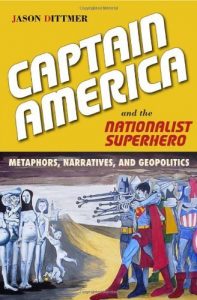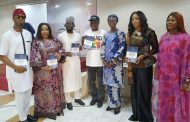Extracted from the website of the Global Governance Institute of the University College London where it was originally published, January 10th, 2020 (https://www.ucl.ac.uk/global-governance/news/2020/jan/imagining-emancipatory-promise-popular-geopolitics-africa), this piece brings-in the popular geopolitics factor in the struggle for the remaking of Africa. Except the graphics and pictures, the piece is as published originally. It reads as follows:
Imagining the Emancipatory Promise of Popular Geopolitics for Africa
A popular geopolitics perspective illuminates how dominant discourses have cemented Africa’s reputation as a dark and hopeless continent. Yet, as Adagbo Onoja argues in this commentary, popular geopolitics may also present strategies for African emancipation.
By Adagbo Onoja*
2019 was a year of mixed fortunes for Africa. Notwithstanding positive developments such as the entry into force of the African Continental Free Trade Area (AfCFTA), the year was overshadowed by much succession turbulence. As Tarak Barkawi and Mark Laffey argue, recurring violence and other problems plaguing the continent are “often explained in terms of a lack of those institutions and attributes associated with European modernity, such as sovereignty, rather than as a consequence of long histories of colonial and postcolonial interaction with the West”. Importantly, these interactions are not limited to material interventions but they include the stories and images that have cemented Africa’s image as the ‘dark continent’ and the European ‘other’.

 Thus, rather than the lack of economic growth, poverty, and combustible inter-group relations that multilateral interventions emphasise, the biggest obstacle for African emancipation (however defined) may be its depiction in historic and contemporary popular discourse. As Robert Saunders argues, Africa has long been a product of a narrativised geography, a fantasyland in the cultural binoculars of its (Western) narrators. US President Donald Trump’s recent derogatory remarks about Africa demonstrate that the discursive spatialisation of the continent is still very much ongoing, bringing into play real and substantive consequences of what Charlotte Epstein calls ‘the power of words in International Relations’.
Thus, rather than the lack of economic growth, poverty, and combustible inter-group relations that multilateral interventions emphasise, the biggest obstacle for African emancipation (however defined) may be its depiction in historic and contemporary popular discourse. As Robert Saunders argues, Africa has long been a product of a narrativised geography, a fantasyland in the cultural binoculars of its (Western) narrators. US President Donald Trump’s recent derogatory remarks about Africa demonstrate that the discursive spatialisation of the continent is still very much ongoing, bringing into play real and substantive consequences of what Charlotte Epstein calls ‘the power of words in International Relations’.
A popular geopolitics perspective illuminates the constitutive force of everyday discourse in the unmaking and remaking of the African continent. Popular geopolitics is concerned with the production and circulation of geopolitical knowledge through mass media, films, the internet and other elements of popular culture. The significance of everyday imagery for geopolitics has been demonstrated by a number of scholarly contributions. For example, Jason Dittmer argues that “the extraordinary reach of popular culture is key to the construction of identity at the scale of today’s meganations such as the United States and China”. Derek Gregory shows how ordinary cultural practices of ‘othering’ helped justify the ‘war on terror’. And Roland Bleiker maintains that images and visuals are “political forces in themselves” that can make things happen.
Applied to Africa, this analytical framework suggests that popular culture is deeply tied up in the international politics of constructing the ‘African condition’. However, it also implies that popular geopolitics, as a resource of power, holds an emancipatory promise for Africa. If the ‘African condition’ is not natural but narrativised and if popular culture is the dominant discursive space, then the power of words and imagery can be used to produce a shift in this space. The potential of popular culture to disrupt hegemonic geopolitical scripts has been explored, for example, by Timothy Luke and Gerald O’Tuathail who demonstrate how mass media coverage of global crises disrupts and curtails official state narratives (the so-called ‘CNN effect’).

A study in American use of popular geopolitics to global primacy

Still waiting for the emancipatory rather than the neoliberal version of ‘Africa Rising’
However, in light of Western cultural hegemony, a critical question is whether newly unfolding discourses of Africa would all reflect a radical ‘imaginative geography’ that resolves rather than reproduces the ‘African condition’? It seems unlikely that the emergence of alternative narratives will, in and of itself, discursively reconstitute Africa beyond the ‘Heart of Darkness’ cliché. Nothing will magically rid popular culture of ‘banal nationalism’, the mediated reproduction of nationalism through casual, everyday ‘othering’. Yet, as Gramsci reminds us, hegemony is inherently unstable. Cracks in the hegemonic script are already apparent, with globalisation complicating global dominance by any single state, as has been argued by John Agnew. In the “complex spatiality of power” he provides are the opportunities for disrupting the dominant global script with alternative narratives.
Hegemonic instability is already being exploited by a diffuse but growing group of diverse transnational activists protesting systemic aberrations rooted in the ‘colonial present’, such as predatory neoliberalism, racism and massive human rights abuses. Africa stands to be the earliest collective beneficiary of this new ‘proletarian internationalism’, which offers opportunities to radically re-imagine the continent. Concerted efforts to counter dominant narratives of Africa as a backward continent in need of charity are reflected, for example, in the ‘Africa Rising’ discourse. Although such efforts of re-branding do not (yet) fundamentally challenge neoliberal scripts, as Christopher Browning and Antonio Ferraz de Oliveira argue, they point to the pluralisation of global discursive space and the potential for popular geopolitics to drive the re-making of Africa. Thus, ironically, the same discursive instruments that reduced Africa to ‘a scar on the conscience of the world’ could become essential tools of African emancipation.
* Onoja, an alumnus of UCL’s MSc Global Governance and Ethics, (2014/15) teaches Political Science at Veritas University, Abuja – Nigeria.




























